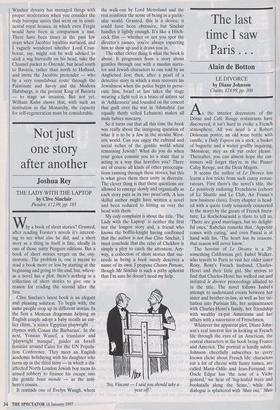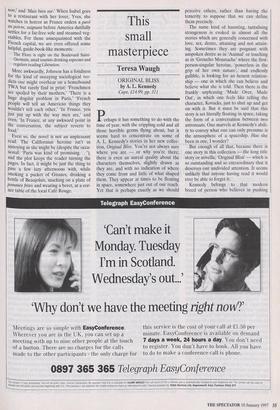The last time I saw Paris . . .
Main de Botton
LE DIVORCE by Diane Johnson Chatto, £14.99, pp. 308 As the interior decorators of the Dome and Café Rouge restaurants have discovered, it isn't hard to evoke a French atmosphere. All you need is a Robert Doisneau poster, an old wine bottle with candle, a Daily Express on a stick, a basket of baguette and a waiter gruffly inquiring, `Monsieur, mey as tik yur erder please.' Thereafter, you can almost hope the cus- tomers will forget they're in the Pinner Cafay Rewge, not the Deux Magots.
It seems the author of Le Divorce has learnt a few tricks from such canny restau- rateurs. First there's the novel's title, the Le positively radiating Frenchness (echoes of Le Shuttle and Le Club, Air France's new business class). Every chapter is head- ed with a quote (only tenuously connected to the story) by the greats of French litera- ture; La Rochefoucauld is there to tell us, `There are good marriages, but no delight- ful ones,' Rabelais remarks that, 'Appetite comes with eating,' and even Pascal is at hand with his, 'The heart has its reasons, that reason will never know.'
The heroine of Le Divorce is a 20- something Californian girl, Isabel Walker, who travels to Paris to visit her older sister Roxy, Roxy's French husband, Charles- Henri and their little girl. She arrives to find that Charles-Henri has walked out and initiated le divorce proceedings alluded to in the title. The novel follows Isabel's attempt to understand events between her sister and brother-in-law, as well as her ini- tiation into Parisian life, her acquaintance with Charles-Henri's family, her friendship with wealthy ex-pat Americans and her affairs with a succession of Frenchmen.
Whatever the apparent plot, Diane John- son's real interest lies in looking at French life through the eyes of an American, the central characters in the book being France and America. The portrait is hardly subtle. Johnson cheerfully subscribes to every known cliché about French life: characters eat a lot of cheese with funny names, are called Marie-Odile and Jean-Fernand, an Oncle Edgar has 'the nose of a Vichy general,' we hear of 'big-leafed trees and bookstalls along the Seine,' while the dialogue is splattered with `Mais oui,"Mais non,' and 'Math bien sur.' When Isabel goes to a restaurant with her lover, Yves, she watches in horror as France orders a pave au poivre, saignant before America dutifully settles for a fat-free sole and steamed veg- etables. For those unacquainted with the French capital, we are even offered some helpful, guide-book-like moments:
The Fiore is right on the Boulevard Saint- Germain, amid tourists drinking espresso and regulars reading Liberation
More awkwardly, Johnson has a fondness for the kind of sweeping sociological ver- dicts one might overhear on a homebound TWA but rarely find in print: 'Frenchmen are spoiled by their mothers,' There is a huge dogshit problem in Paris,' French People will tell an American things they wouldn't tell each other,' In France, you just put up with the way men are,' and even, 'In France, at any awkward point in the conversation, the subject reverts to food.'
Even so, the novel is not an unpleasant read. The Californian heroine isn't as annoying as she might be (despite the occa- sional: 'Paris was kind of promising. '), and the plot keeps the reader turning the pages. In fact, it might be just the thing to pass a few lazy afternoons with, while smoking a packet of Gitanes, drinking a bottle of Beaujolais, snacking on a plate of pommes frites and wearing a beret, at a cor- ner table of the local Café Rouge.



























































 Previous page
Previous page